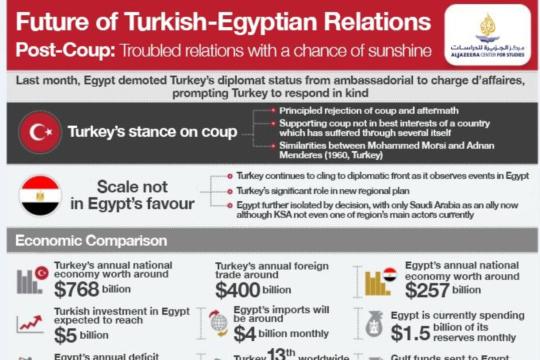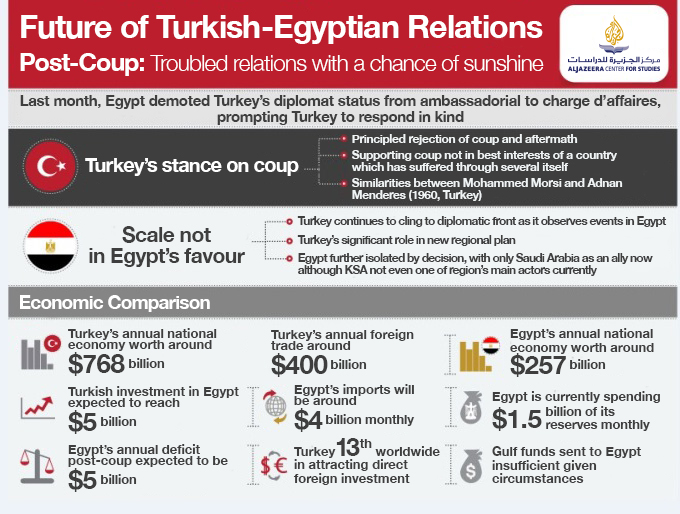
 |
| [Al Jazeera] |
| Abstract On November 23, 2013, the Egyptian foreign ministry issued a statement demoting the Turkish ambassador in Cairo from diplomatic representation to charge d’affaires, prompting Turkey to respond in kind and sparking speculation about the future of Egyptian-Turkish ties. This report examines Turkey’s position on Egypt after the military coup and how tensions between the two sides have evolved into a bilateral decision to downgrade diplomatic representation and the repercussions on political and economic ties which follow this decision. The report also discusses the nature of these consequences and whether they are temporary or long-lasting. |
Introduction
When Lt. Gen. Abdul Fattah al-Sisi and the Egyptian military ousted the first elected president in Egypt’s modern history, Turkey labelled the development as a military coup, defending its position on three premises:
- Egypt’s coup was significant at the regional and international level, with some countries supporting the coup and others avoiding a stance until the dust had settled and outcomes were clear. The African Union labelled it as a coup and suspended Egyptian membership in the bloc. For Turkey, a country which had made considerable efforts to support the new democracy in the post-Mubarak era, the coup was likely to have an impact on its calculations in the region, (1) making the principled position taken by Turkey bold but well-earned. (2)
- Turkey’s perspective on the coup is impacted by its own negative history with the military’s impact on politics. While the Turkish army is popular, its 1960, 1971, 1980 and 1997 coup d’états led to unprecedented deterioration in the country. (3) For Turks, the overthrow of Morsi was far too reminiscent of the Turkish army’s coup overthrowing Adnan Menderes in 1960. Menderes had been democratically elected prime minister of the Turkish republic when the military tried him and two of his ministers then proceeded to execute them. (4)
- Silence by Turkey could be misinterpreted within the country, emboldening the opposition and those who support the Ergenekon network which attempted a coup mimicking the Egyptian one. This is particularly relevant given the Justice and Development Party (AKP)’s narrow escape from an illegal attempt to topple the party in 2007.
It is worth noting the AKP had anticipated a coup in Turkey even before the events in Egypt, pre-emptively accelerating the amendment of Article 35 of the Turkish constitution that governs the rule of the military and had been repeatedly used to justify coups. The amendment, passed on July 17, 2013, (5) was followed by several August trials of those involved in the plot, including the former chief of staff General ?lker Ba?bu?. (6)
From tension to downgraded diplomatic representation
The polarised situation between Turkish and Egyptian authorities led Ankara to publicly re-assert its stance on the coup, (7) further deteriorating ties between the countries. The situation was further exacerbated when authorities in Cairo attempted to incite nationalist sentiment and systematically link the Muslim Brotherhood in Egypt with the Turkish government, calling it the international organisation of the Muslim Brotherhood.
In August, each side recalled their ambassador; however, three weeks later, Ankara returned its envoy (8) after internal discussions that public principled positions were sufficient. Ankara did not want to escalate the situation and also wanted to be kept abreast of events in Egypt and their regional and international implications.
On November 23, the situation deteriorated once again when Cairo announced the Turkish ambassador was downgraded to the level of charge d’affaires as a result of “Turkey’s unacceptable and unjustified positions of trying to turn the international community against Egyptian interests by supporting meetings for groups seeking to create instability in the country and making statements that can only be described as offensive,” (9) causing Turkey to respond in kind. (10)
Expected implications
Turkey was not keen on escalating diplomatic confrontation with Egyptian authorities, (11) indicating that this move was more from the Egyptian side. The decision by Egypt to engage at that time left it exposed to consequences on the political and economic levels – consequences which would also have repercussions for Turkey.
Political
A. Turkey
-
With this move, Turkey lost a key source of information on developments in Egypt. To reverse such downgrading of ties requires a change in the conditions which caused the downgrade, and there is no fixed time for a successful reversal, particularly given existing tensions between the two countries.
-
Turkey believes the situation will resolve itself sooner rather than later – in other words, Turkey believes present conditions in Egypt will not allow military authorities to remain in power for long if they continue with the same policies. Both the Turkish president and his adviser expressed this position, clearly differentiating between the Egyptian authorities and people and voicing hope for ties between the two countries to be restored soon, particularly given the deep relationship between the Turkish and Egyptian peoples. (12)
-
On a regional level, Egypt is important to Turkey, and with the decision to downgrade ties, Ankara has indefinitely lost its gateway into the Arab world. However, regional implications do not look very grave, especially in light of US and Iranian efforts to attract Turkey into regional arrangements.
B. Egypt
-
Egypt seems to have put itself in an unenviable position, especially if Turkey chooses to publicly re-assert its position once more or other countries follow suit. Cairo will then have to remain silent and look weak in taking action to silence criticism, or further alienate itself with key regional and international actors by making more decisions similar to the Turkey one.
-
Egypt’s decision has further isolated it regionally and internationally – after the coup, only a few countries recognise the new government while the majority deal with it as a temporary, de facto body. Egypt’s ties with superpowers such as Washington and Moscow are not good, and only Saudi Arabia remains supportive of this government. The significance of this is not overwhelming given the US’ recent snubs to the kingdom on issues such as the Syrian crisis and Iran’s nuclear capabilities.
-
Egypt’s stance in the region is particularly weak and isolated at this point given its unhealthy ties with Turkey and Iran, two regional powers. Egypt is now an outsider as far as significant regional issues are concerned, including Syria, the peace process, Fatah-Hamas reconciliation and the Iranian nuclear issue. It has no role or practical influence at a time when regional roles are being redrawn for several countries simultaneously with the output of regional and international competition arising from Arab revolutions.
Economic
Trade volume between the two countries is set to decrease given the downgrade in diplomatic ties, but this will not affect Turkey as badly as it will affect Egypt. The size of the Turkish economy is $768 billion, and its foreign trade is $400 billion. Compared to those of Egypt and to the size of bilateral trade, these figures are quite large. (13) According to the World Bank, Egypt’s economy is at $257 billion, or two-thirds of Turkey’s; therefore, any damage to bilateral economic relations will harm Egypt more, especially since the Egyptian economy has slowed down in most key economic sectors, investments have dropped and debt has risen after the military coup. The Egyptian government is currently struggling to secure $4 billion to pay for its monthly imports, and it has been forced to spend $1.5 billion of its reserves every month to cover these purchases amid forecasts that the deficit in current expenditures amounts to $5 billion since the coup. (14)
Gulf states have pledged $12 billion in assistance to Egypt and have already delivered $7 billion to Egyptian authorities, (15) but the assistance has not yet had a positive impact on the Egyptian economy or its citizens. Egypt, then, is in need of every dollar it can attract in the form of foreign investment, unlike Turkey, which is ranked thirteenth globally in its direct foreign investment.
Thus, Egypt’s insistence on engaging with Turkey in the political rather than the economic arena is not driven by Cairo’s keenness on bilateral ties but rather by its keenness to preserve economic ties at a time when they are in dire need of Turkish and other foreign investment. Egypt committed itself to continued economic ties with Turkey even as it downgraded diplomatic ties. This is illustrated in statements from Egyptian Minister of Industry and Trade, Munir Fakhri Abdel-Nour, welcoming all existing or potential Turkish investments, promising to address any problems with the investments and noting that the government was resolute in separating economic and political ties. (16) President of the Egyptian-Turkish Business Council and the Port Said Chamber of Shipping Adel al-Lamaa reiterated the sentiment when he stated that trade and investment between the two countries would not be affected by political and diplomatic events. (17)
For Turkey, there is undoubtedly interest in continued economic and investment ties with Egypt because that would facilitate swift return of full diplomatic ties. While regional crises prompting tensions between Ankara and other actors have not prompted it to use investment as a weapon in the same reactionary manner as other Arab countries, it is inevitable that further deterioration in ties will force Turkey to halt future investments in Egypt, estimated at $5 billion. (18)
Conclusion
Turkey considers current tensions between the two countries a temporary stage, pending the return of democracy in Egypt. Meanwhile, Egyptian authorities are not giving any sign as to when these ties might return to normal in the political arena, despite their keenness to continue them at the economic level. This suggests they are waiting for Turkish recognition of their legitimacy as a de facto power, an unlikely scenario.
__________________________________
Ali Hussein Bakeer is a researcher at the International Strategic Research Organization (USAK).
References
1- Ali Hussein Bakeer (2013), “Egypt in Turkey’s foreign policy, post-revolution reality and future prospects”, Al Jazeera Center for Studies, 3 January 2013.
2- Al Jazeera (2013), ‘Turkey FM: we have deep love for Egypt”, 24 November 2013,
www.aljazeera.com/video/middleeast/2013/11/turkey-fm-deep-love-egypt-201311241641440187.html.
3- Al Jazeera (2012), “Timeline: A history of Turkish coups”, 4 April 2013, www.aljazeera.com/news/europe/2012/04/20124472814687973.html.
4- CBC (2013), “Egypt’s “dangerous precedent” and Turkey’s history of coups”,6 July 2013,
www.cbc.ca/news/world/egypt-s-dangerous-precedent-and-turkey-s-history-of-coups-1.1356899.
5- Hurriyet Daily News (2013), “Turkish Parliament OKs change on coup pretext article”, www.hurriyetdailynews.com/turkish-parliament-oks-change-on-coup-pretext-article.aspx?pageID=238&nID=50706&NewsCatID=338.
6- Today's Zaman (2013), “Long sentences for Ergenekon suspects, life for ex-army chief”, 5 August 2013, www.todayszaman.com/news-322781-long-sentences-for-ergenekon-suspects-life-for-ex-army-chief.html.
7- Al Jazeera (2013), “Turkey FM: we have deep love for Egypt”.
8- Hurriyet Daily News (2013), “Turkey sends back envoy to Cairo despite chilly ties”, 4 September 2013, www.hurriyetdailynews.com/turkey-sends-back-envoy-to-cairo-despite-chilly-ties.aspx?pageID=238&nID=53798&NewsCatID=352.
9- USA TODAY (2013), “Egypt expels Turkish ambassador, scales back ties”, 23 November 2013, www.usatoday.com/story/news/world.
10- Sabah (2013), “Turkey’s foreign ministry issues response to Egypt downgrading ties”, 23 November 2013, http://english.sabah.com.tr/national/2013/11/23/turkeys-foreign-ministry-issues-response-to-egypt-downgrading-ties.
11- Hurriyet Daily News (2013), “Turkey sends back envoy to Cairo despite chilly ties”.
12- Sabah (2013), ‘”Egypt downgrades ties with Turkey”, 23 November 2013, http://english.sabah.com.tr/world/2013/11/23/egypt-downgrades-ties-with-turkey.
13- Turkey Central Bank.
14- Ali Bakeer (2013), “Whither Egypt?”, Turkish Weekly, 18 November 2013, www.turkishweekly.net/columnist/3810/-whither-egypt.html.
15- Reuters (2013), “Egypt received $7 billion of promised $12 billion in Gulf aid - central bank”, 29 September 2013, http://uk.reuters.com/article/2013/09/29/uk-egypt-finances-idUKBRE98S05N20130929.
16- Al-Hayat (2013), “Egypt: Turkish investments in Egypt stand at $2 billion”, 13 September 2013, http://alhayat.com/Details/551070.
17- Al-Masry El Youm (2013), “Turkish investors rule out leaving Egypt as a result of political differences”, 24 November 2013, www.almasryalyoum.com/node/2338266.
18- Al-Ahram (2013), “President of Egyptian-Turkish Business Association: Turkish projects in Egypt stay”, www.ahram.org.eg/NewsQ/244266.aspx .